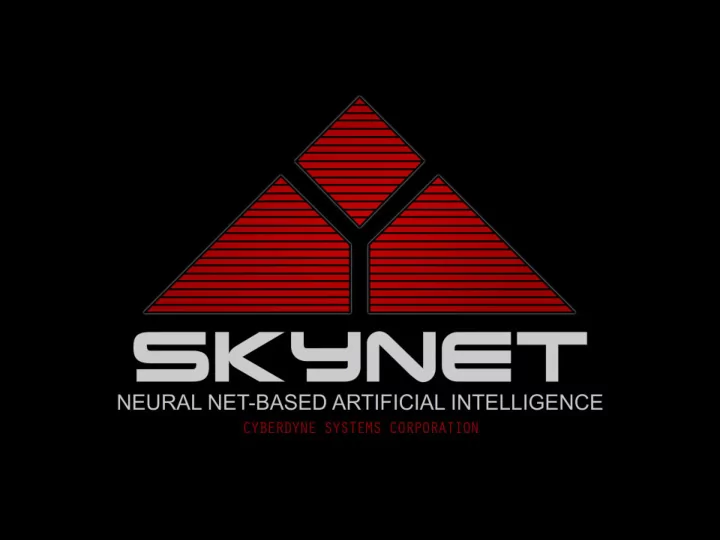

August 4, 1997: Skynet goes online
August 29, 1997, 2:14am ET: Skynet gains ‘consciousness’
August 29, 1997: Judgement Day
Terminator (1984)
What ‘features’ does T-800 have?
What ‘features’ does T-800 have? • Vision/Perception • Speech • Motion/Planning • Object Manipulation • Self-Repair • Goal-directed Exploration • Social Skills • Ethics/Morality
Back to our timeline..
1960’s (1 st Wave) • Single Layer networks • XOR problem killed research for two decades
Mid-1980s (2 nd Wave) • Multi-layer networks • Backpropagation algorithm
2010s (3 rd Wave) • Big Data – O(M) labeled images • Big Compute • ‘Deep’ Learning
- 19 -
ImageNet Architecture
Deep Learning for Computer Vision
Slide Courtesy of Nervana Systems
Deep Learning for Segmentation
Deep Learning for Caption Generation
Deep Learning for Speech
Google Assistant
IBM Watson
IBM Project Debater
DARPA Robotics Challenge
MIT Cheetah
Object Manipulation
Object Manipulation
DARPA Autonomous Driving Challenge
Deep Learning for Self-Driving Cars
Some Failures…
Can Deep Learning Work for Science? Similarities • Tasks: – Pattern Classification • Regression • Clustering • Feature Learning • Anomaly Detection • Differences • Unique attributes of Scientific Data – Multi-channel / Multi-variate • Double precision floating point • Noise and Artefacts • Statistics are likely different •
CAM5 0.25-degree simulation data
Challenge: Multi-Variate Data
Climate Science Tasks - 44-
Supervised Convolutional Architecture Logistic K-Nearest Support Random ConvNet Regression Neighbor Vector Forest Machine Test Test Test Test Test Tropical Cyclone 95.85 97.85 95.85 99.4 99.1 Atmospheric Rivers 82.65 81.7 83.0 88.4 90.0 Weather Fronts 89.8 76.45 90.2 87.5 89.4
Semi-Supervised Convolutional Architecture (NIPS’17) Encoder Decoder Classification + Bounding Box Regression Contributors: Evan Racah, Chris Pal, Chris Beckham, Samira Kahou, Tegan Maharaj. MILA
Classification + Regression Results Ground Truth Prediction Contributors: Thorsten Kurth, Jian Yang, Ioannis Mitliagkas, Chris Pal, Nadathur Satish, Narayanan Sundaram, Amir Khosrowshahi, Michael Wehner, Bill Collins, Intel, Stanford, LBL, MILA.
Deep Learning at 15PF (SC’17)
Segmentation Contributors: Mayur Mudigonda, Thorsten Kurth, Sean Treichler, Josh Romero, Massimiliano Fatica, Mike Houston. UC Berkeley, LBL, NVIDIA
Segmentation Results - 50-
Deep Learning for Science Generating cosmology mass maps Decoding speech from ECoG Modeling galaxy shapes Oxford Nanopore sequencing LHC Signal/Background classification Clustering Daya Bay events
Deep Learning Hardware - 52-
Deep Learning Software Technologies Deep Learning Neon, CNTK, MXNet, … Frameworks MLSL Horovod Multi Node libraries MPI GRPC Single Node libraries CuDNN MKL-DNN Hardware CPUs (KNL) GPUs FPGAs Accelerators
Open Challenges 1. Performance and Scaling 2. Complex Data 3. Hyper-Parameter Optimization 4. Scarcity of Labeled Data 5. Interpretability and Visualization 6. Theory
Assumptions… • Communities will self-organize and conduct labeling campaigns – Active Learning systems can determine optimal strategies for seeking labels • Incorporation of domain science principles into learning algorithms – Solution spaces that satisfy physical constraints • Pattern Classification, Clustering, Anomaly Detection are solved problems
What is the role of humans? Labels Mechanisms, Hypothesis HPSS /project Patterns, Clusters, Anomalies
How close are we to creating a T-800? • Vision/Percep,on ! " # • Speech " $ % • Mo,on/Planning ! $ • Object Manipula,on & • Self-Repair ☹ • Goal-directed Explora,on ( • Social Skills ) • Ethics/Morality *
How about the T-1000 and T-X?
Time Travel?
Conclusions • AI appears to be working – Genuine breakthroughs in vision, speech, control – Wide range of commercial applications • Tremendous potential for scientific applications – Low-hanging fruit, but hard questions are coming next • NERSC is at the forefront of Deep Learning for Science – Applications – Hardware and Software – R&D on optimizations + scaling, methods
Thanks! • Contact: prabhat@lbl.gov • Connect on LinkedIn • Internships, full-time opportunities
Recommend
More recommend